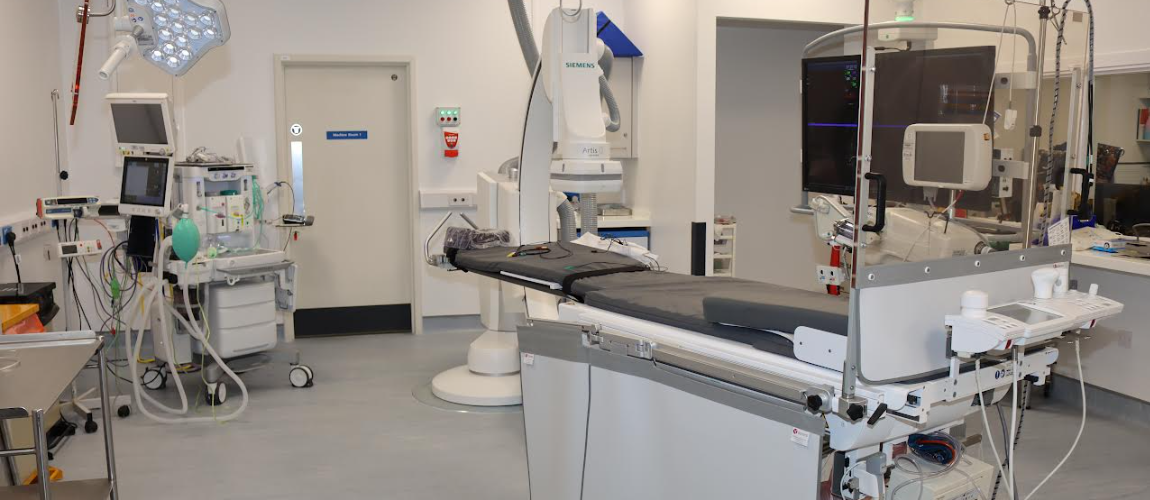Cardiology
West Herts Cardiology department has highly qualified and experienced consultants, providing a range of subspecialist expertise. It has two cardiac catheter laboratories and advanced imaging facilities, including CT and MRI, offering procedures and diagnostics often not available at smaller private hospitals or many district general hospitals, usually provided at tertiary centres.
Here are some of the common services available from West Herts cardiology.
Procedures
- Coronary assessment and treatment
- Diagnostic angiography: invasive tests to assess coronary artery (arteries of the heart) anatomy
- Angioplasty: uses a balloon to stretch open a narrowed or blocked coronary artery
- Fractional flow reserve (FFR) tests coronary narrowings to assess their severity and potential to impede the delivery of oxygen to the heart muscle
- Intravascular ultrasound (IVUS): produce ultrasound images of the coronaries and can show the entire artery wall to help assess the severity of any narrowing.
- Stenting: A stent is a tiny metal tube that can be inserted into a blocked artery to restore and maintain the flow of blood to the heart
- Heart rhythm assessment and treatment (Electrophysiology/EP)
- EP studies: a low risk, invasive test to assess the heart’s electrical conduction system and propensity to heart rhythm disturbance (arrhythmia).
- Catheter ablation: a low risk, invasive treatment for arrhythmias such as SVT and atrial flutter.
- Cardiac devices
- Device Implantation: day case procedures usually performed under local anaesthetic, including:
- Pacemakers: devices that regulate the heart rate preventing symptoms from low pulse.
- Loop recorders: small injectable devices implanted under the skin of the chest wall to monitor for and diagnose arrhythmia as cause of symptoms such as loss of consciousness or palpitations.
- Implantable cardioverter defibrillators (ICDs): devices that monitor for and treat potentially life-threatening arrhythmias.
- Cardiac re-synchronisation: devices that resynchronise the electrical and mechanical pumping of the heart to improve heart function, breathing and prognosis
- Cardiac device follow-up: all patients with implantable devices have long
term follow-up to ensure that their device is working well and that no
underlying heart rhythm issues occur.
The majority now are being remotely monitored by home monitoring devices that can transmit the hospital data immediately by telephone line if any issues occur.
- Imaging
- Echocardiography (echo): ultrasound scan to assess the structure and function of the heart muscle and heart valves.
- Transoesophageal echocardiography (TOE): an invasive ultrasound test performed by passing a small probe into the food pipe from the mouth, under sedation to assess the heart in more detail.
- Stress echocardiography: a non-invasive echo test that can either be done by exercising on a bike or through an intravenous infusion of medication to raise the heart rate. This specifically looks for evidence of poor blood supply to areas of the heart.
- Computed Tomography (CT) coronary angiogram: a non-invasive test to assess the presence of coronary artery disease in the heart.
- Cardiac Magnetic Resonance Imaging (cMRI): an advanced non-invasive test to assess structure and function of the heart but in greater detail to the point of being able to see within the heart muscle.
To find out more about specific conditions, see our patient information leaflets:
- Atrial fibrillation ablation
- Atrial flutter ablation
- Direct electrical cardioversion (DCCV)
- Electrophysiology study (EP)
If you are interested in any of the above, please contact Lorraine Jones.
Tel: 01923 436499 or email: lorraine.jones23@nhs.net
Consultants
Our consultants have years of training and experience in the NHS as well as private consultancy. Find out more about them here:

